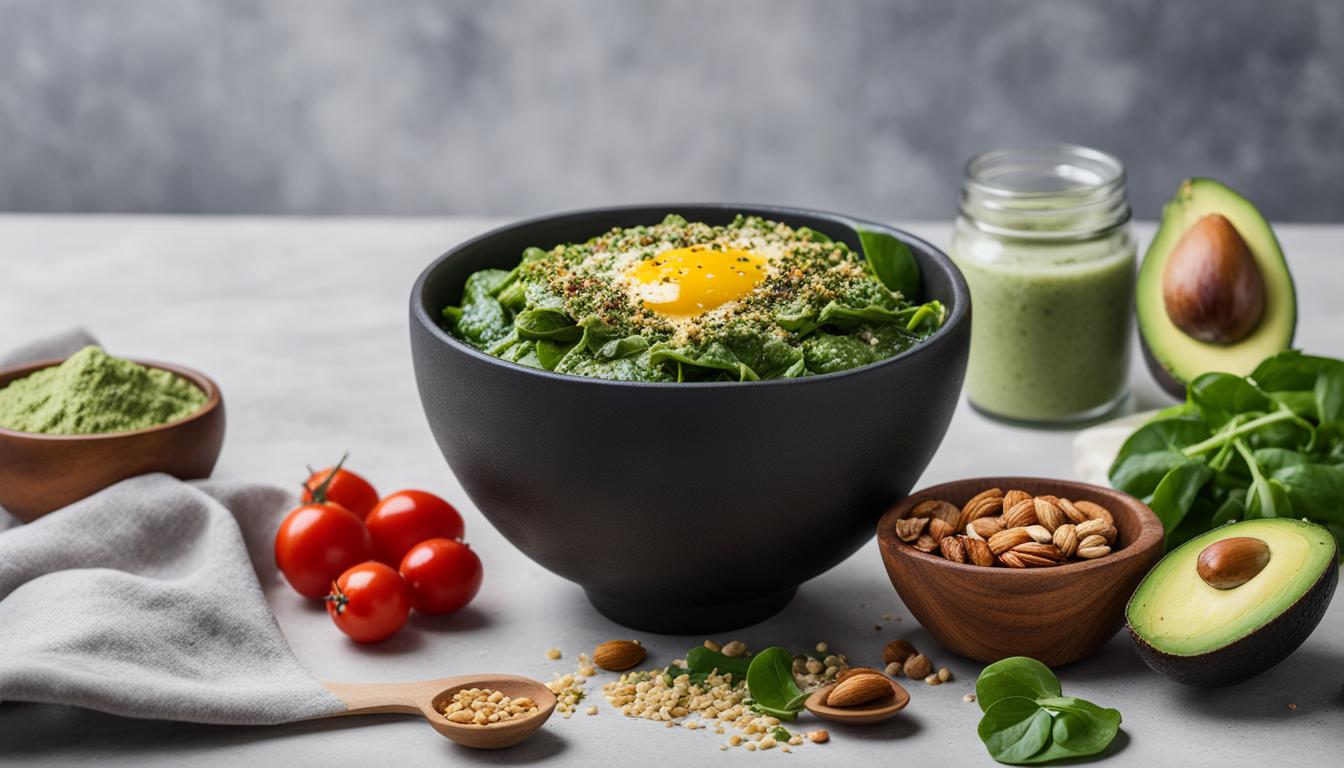Are Protein Shakes Keto-Friendly? Exploring the Rise of Ketogenic Diet and the Role of Protein Shakes in Muscle Recovery and Satiety
Exploring the Rise of Ketogenic Diet and the Role of Protein Shakes
Hey there, fellow health enthusiasts! Have you noticed the surge in popularity of the ketogenic diet and the increasing consumption of protein shakes? It’s truly fascinating to see how these trends have taken the health and fitness world by storm. In this article, we’ll delve into the reasons behind the widespread adoption of the ketogenic diet and the pivotal role of protein shakes in muscle recovery and satiety. So, grab a cup of bulletproof coffee or a delicious keto-friendly smoothie and let’s explore this exciting topic together!
It’s no secret that the ketogenic diet has captured the attention of countless individuals who are seeking an effective way to improve their health and well-being. Research has shown that the ketogenic diet can offer a myriad of benefits, such as weight management, improved cognitive function, and enhanced energy levels1. With such appealing advantages, it’s no wonder that people are increasingly turning to the ketogenic lifestyle.
Now, let’s talk about the significant role of protein shakes in the realm of fitness and nutrition. Protein shakes have become a go-to option for many health-conscious individuals, especially those following a ketogenic diet. These shakes are not only convenient but also play a crucial role in supporting muscle recovery and promoting satiety2.
So, why the sudden surge in the consumption of protein shakes among those on the keto journey? The answer lies in the practicality and effectiveness of protein shakes in providing the necessary nutrients while keeping carbohydrate intake low. As more people recognize the importance of sufficient protein intake for muscle repair and growth, protein shakes have emerged as a convenient and reliable source of high-quality protein3.
Furthermore, the appeal of protein shakes for those following a ketogenic diet is heightened by the fact that many of these shakes are low in carbs and rich in healthy fats, aligning perfectly with the macronutrient ratios recommended for a ketogenic lifestyle. This makes them a valuable addition to a keto-friendly meal plan, allowing individuals to easily meet their protein requirements without compromising their state of ketosis4.
As we journey through this article, we’ll uncover the fascinating relationship between the ketogenic diet and protein shakes, exploring how they complement each other to bring about optimal health and well-being. So, stay tuned as we unravel the truth behind the question, “Are protein shakes keto-friendly?” This is going to be an enlightening and empowering adventure!

What is a Keto Diet?
Before we dive into the specifics of whether protein shakes are keto-friendly, let’s first understand what the ketogenic diet is all about. A keto diet is a high-fat, moderate-protein, and low-carbohydrate eating plan. The primary goal of this diet is to shift the body’s metabolism away from using glucose as the main source of energy to using fat, in the form of ketones, as fuel.
Research has shown that following a ketogenic diet can have various health benefits, including weight loss, improved blood sugar control, and enhanced mental clarity. The diet’s principles of low carb, moderate protein, and high fat intake force the body to enter a metabolic state known as ketosis, where it becomes incredibly efficient at burning fat for energy.
When you consume a low amount of carbohydrates, your body depletes its glucose reserves and begins to produce ketones from stored fat. This natural process of ketosis can lead to significant reductions in blood sugar and insulin levels.
The Principles of a Keto Diet
The keto diet typically involves reducing carbohydrate intake to around 20-50 grams per day. This minimal carb intake shifts your body’s metabolism into a state of ketosis. In addition to limiting carbs, the diet emphasizes consuming moderate amounts of protein and high levels of healthy fats.
This balance of macronutrients is vital to the keto diet’s success. Protein consumption is moderate to prevent the body from converting excess protein into glucose through a process called gluconeogenesis. Fat intake is increased to provide a steady supply of energy in the absence of glucose.
Additionally, high-fat foods are a significant component of the keto diet. Foods such as avocados, nuts, seeds, and healthy oils like olive oil and coconut oil are encouraged. These fats play a crucial role in keeping you feeling full and satisfied, making it easier to adhere to the low-carb, high-fat principles of the diet.
By following these dietary guidelines, individuals on a keto diet aim to maximize fat burning, minimize insulin levels, and achieve a state of metabolic efficiency.
Role of Protein Shakes on Keto Diet
Protein shakes have become a popular dietary aid, especially in the realm of the ketogenic diet. Many people rely on protein shakes to fill nutritional gaps, aid muscle recovery, and provide a convenient source of protein. When it comes to the keto diet, the role of protein shakes can be both beneficial and potentially challenging. Let’s explore the potential benefits and drawbacks of incorporating protein shakes into a keto lifestyle.
Potential Benefits
One of the key benefits of protein shakes on a keto diet is their ability to provide a quick and easy source of high-quality protein. Research has shown that a high protein intake is essential for maintaining muscle mass, promoting satiety, and supporting weight management on a ketogenic diet [1]. Protein shakes can be particularly helpful for individuals who struggle to meet their daily protein requirements through whole food sources alone.
Furthermore, protein shakes can serve as a convenient option for post-workout nutrition, helping to support muscle recovery and growth. Whey protein, in particular, has been extensively studied for its role in stimulating muscle protein synthesis, which can be beneficial for individuals engaging in resistance training or other forms of exercise [2].
Potential Drawbacks
While protein shakes offer several advantages, it’s essential to be mindful of certain drawbacks, especially when following a ketogenic diet. Some protein shakes on the market contain added sugars, artificial flavors, and other non-keto-friendly ingredients. These can potentially spike insulin levels and hinder the process of ketosis, the metabolic state central to the success of a keto diet.
Moreover, relying too heavily on protein shakes may lead to a lack of diversity in the diet, potentially resulting in nutrient deficiencies and an imbalance in macronutrient intake. It’s crucial to prioritize whole, nutrient-dense foods and use protein shakes as a supplement rather than a primary source of protein in the keto diet.
Ultimately, the decision to incorporate protein shakes into a keto lifestyle should be based on individual needs and preferences. When selecting a protein shake, it’s important to opt for products specifically formulated with keto-friendly ingredients and low in added sugars. Additionally, considering whole food sources of protein, such as lean meats, eggs, and dairy, is paramount for achieving a well-rounded, nutritious ketogenic diet.
In conclusion, protein shakes can be a helpful addition to a keto diet when chosen thoughtfully and used in moderation. Always prioritize nutrient-dense whole foods while keeping in mind the potential benefits and drawbacks of incorporating protein shakes into your ketogenic lifestyle.
Sources:
[1] Westerterp, K. R. (2004). Diet induced thermogenesis. Nutrition & Metabolism.
[2] Cermak, N. M. et al. (2012). Protein supplementation augments the adaptive response of skeletal muscle to resistance-type exercise training: a meta-analysis. The American Journal of Clinical Nutrition.
Carbohydrate Content in Protein Shakes
When it comes to the ketogenic diet, keeping carbohydrate intake low is crucial for staying in ketosis and reaping the benefits of fat burning for energy. This makes analyzing the carbohydrate content of popular protein shakes essential to determine their compatibility with the keto diet.
Many protein shakes contain added sugars, artificial flavors, and thickeners, which can significantly increase their carbohydrate content. According to a study published in the Journal of Nutrition and Metabolism, the carbohydrate content in popular protein shakes varies widely, with some containing as much as 20-30 grams of carbs per serving.
For a protein shake to be keto-friendly, it’s generally recommended to keep the carbohydrate content at around 5 grams or less per serving. This is in line with the typical daily carbohydrate limit of 20-50 grams for individuals following a ketogenic diet.
When selecting a protein shake for a keto lifestyle, it’s essential to carefully read the nutrition label and ingredient list. Look for shakes that are specifically labeled as “keto-friendly” or “low-carb,” and opt for those sweetened with natural keto-friendly sweeteners like stevia or monk fruit.
Additionally, choosing protein shakes that are made with high-quality, low-carb ingredients such as grass-fed whey protein or collagen can further support the goals of the keto diet while providing the benefits of muscle recovery and satiety.
By being mindful of the carbohydrate content in protein shakes and making informed choices, it’s absolutely possible to enjoy the convenience and nourishment of protein shakes while staying true to the principles of a keto lifestyle.

Examining the Quality and Source of Proteins in Protein Shakes
When it comes to the ketogenic diet, the quality and source of proteins in protein shakes are crucial for ensuring they are keto-friendly. The protein sources in these shakes play a significant role in supporting muscle recovery and promoting satiety.
For keto dieters, it’s essential to opt for protein shakes that primarily use high-quality, low-carb protein sources. Research has shown that whey protein, which is a complete protein containing all essential amino acids, can be highly beneficial for muscle building and recovery, making it an excellent choice for keto-friendly protein shakes.
Additionally, plant-based protein sources such as pea protein and hemp protein have gained popularity in the ketogenic community. These protein sources not only provide the necessary amino acids but also offer the added benefits of being low in carbohydrates, making them suitable for individuals following a keto diet.
Examining the source of proteins used in protein shakes is equally important. It’s advisable to look for shakes that use proteins sourced from high-quality, organic sources. Organic protein sources are free from pesticides and harmful chemicals, aligning with the clean and natural principles of the ketogenic diet.
When selecting a protein shake for a keto diet, it’s beneficial to prioritize products that contain protein from grass-fed sources. Grass-fed proteins have been found to have a better nutrient profile, with higher levels of omega-3 fatty acids and antioxidants, making them a healthier option for keto dieters.
Evaluating the Impact of Additives and Sweeteners in Protein Shakes
When it comes to the ketogenic diet, the impact of additives and sweeteners in protein shakes on ketosis and overall health is a topic of significant interest. Many people rely on protein shakes to supplement their diets, especially when they are on-the-go or after a workout. However, it’s essential to examine the ingredients in these shakes to ensure they align with the principles of the keto diet.
Research has shown that certain additives and sweeteners can influence blood sugar levels and insulin response, which are critical factors in maintaining ketosis. For instance, some protein shakes contain artificial sweeteners like aspartame or sucralose, which may have a minimal impact on blood glucose levels. On the other hand, some sugar alcohols like erythritol and stevia have shown little to no effect on blood sugar, making them favorable options for those following a ketogenic lifestyle.
It’s important to note that individual responses to additives and sweeteners can vary, and some people may experience digestive issues or cravings when consuming certain ingredients. Therefore, it’s crucial to read labels carefully and choose protein shakes with minimal additives and natural sweeteners to support ketosis and overall health.
When you’re shopping for protein shakes, look for products labeled “keto-friendly” or “low-carb,” and pay attention to the net carbohydrate content per serving. Additionally, consider selecting shakes that are free from artificial colors, flavors, and preservatives to prioritize your health and wellness on the keto diet. Remember, not all protein shakes are created equal, so being mindful of the ingredient list is key to ensuring that your protein shakes align with the ketogenic principles and support your well-being.
Benefits of Protein Shakes on Keto
Protein shakes have become increasingly popular among fitness enthusiasts, especially those following a ketogenic lifestyle. Are protein shakes keto-friendly? Let’s explore the potential advantages of including protein shakes in a keto diet, particularly in terms of muscle recovery and satiety.
Muscle Recovery
When it comes to muscle recovery, protein shakes can play a vital role in supporting the repair and growth of muscle tissue, especially after intense workouts. According to a study published in the Journal of the International Society of Sports Nutrition, consuming protein in close proximity to exercise can enhance muscle protein synthesis and promote faster recovery. For individuals following a ketogenic diet, which tends to be moderate in protein, incorporating high-quality protein shakes can ensure an adequate intake of this essential macronutrient for optimal muscle recovery.
Satiety
One of the key benefits of protein shakes on a keto diet is their ability to promote satiety. Research published in the American Journal of Clinical Nutrition indicates that protein has a greater satiating effect compared to carbohydrates or fats. This means that including protein shakes in your keto meal plan can help control hunger pangs and support weight management, making it easier to adhere to the low-carb, high-fat ketogenic diet.
Moreover, a study in the Obesity Reviews journal suggests that a higher protein intake, which can be facilitated by protein shakes, may contribute to greater feelings of fullness and reduced overall caloric intake, potentially aiding in weight loss efforts while following a keto lifestyle.
In conclusion, protein shakes can indeed be keto-friendly and offer substantial benefits for muscle recovery and satiety. Whether you’re an athlete looking to optimize post-workout nutrition or simply aiming to stay full and satisfied on a keto diet, incorporating protein shakes into your dietary routine can provide valuable support for your fitness and wellness goals.

Addressing the Downsides of Protein Shakes on Keto
While protein shakes can be a convenient and effective way to supplement your ketogenic diet, there are some potential downsides that need to be addressed. It’s important to be mindful of hidden carbs, potential digestion issues, and the reliance on supplementation.
Hidden Carbs
One of the main concerns when incorporating protein shakes into a keto diet is the presence of hidden carbs. Some commercially available protein powders may contain additives, sweeteners, or thickeners that can add to the carb count. As a keto enthusiast, it’s crucial to carefully read the nutrition labels and ingredients list to ensure that the protein powder is low in carbohydrates and free from any hidden sugars or starches.
A study published in the American Journal of Clinical Nutrition found that certain protein supplements contained high levels of added sugars, which could counteract the metabolic benefits of a ketogenic diet. Therefore, it’s essential to select protein shakes that are specifically designed for the keto lifestyle, with minimal to no added sugars or fillers.
Digestion Issues
Some individuals may experience digestive discomfort when consuming protein shakes, especially if they contain lactose or certain types of protein. Research published in the Journal of the International Society of Sports Nutrition suggests that whey protein, a common ingredient in many shakes, may lead to gastrointestinal symptoms such as bloating, gas, and cramps in some individuals.
If you find that certain protein shakes cause digestive issues, it’s advisable to switch to alternative protein sources such as plant-based or collagen protein powders, which are generally easier to digest and less likely to cause discomfort.
Reliance on Supplementation
While protein shakes can be a convenient way to boost your protein intake, there is the risk of relying too heavily on supplementation rather than obtaining nutrients from whole food sources. A study in the Journal of the International Society of Sports Nutrition emphasizes the importance of obtaining nutrients from a variety of whole foods to ensure a well-rounded nutrient intake and to avoid deficiencies that can arise from over-reliance on supplements.
Therefore, it’s essential to view protein shakes as a complementary addition to your diet rather than a primary source of nutrients. Focus on incorporating a balance of high-quality, whole food sources of protein such as fish, poultry, eggs, and tofu in addition to protein shakes to support overall health and well-being.
By being mindful of hidden carbs, potential digestion issues, and the reliance on supplementation, you can navigate the potential downsides of protein shakes on a keto diet, ensuring that they align with your health and wellness goals.
Are Protein Shakes Keto-Friendly? Exploring the Rise of Ketogenic Diet and the Role of Protein Shakes in Muscle Recovery and Satiety
Best Practices for Choosing Keto-Friendly Protein Shakes
When it comes to selecting protein shakes that align with keto principles and preferences, there are a few factors to consider. Let’s dive into some tips to help you pick the best keto-friendly protein shakes:
Check the Carb Content
First and foremost, it’s crucial to examine the carb content of the protein shake. A keto-friendly protein shake should have a low carb content to ensure it won’t kick you out of ketosis. Ideally, look for shakes with fewer than 5 grams of net carbs per serving. This will help you stay within your daily carb limit while enjoying a protein boost.
Look for High-Quality Protein Sources
Opt for protein shakes that contain high-quality protein sources such as whey protein isolate, collagen peptides, or plant-based proteins like pea protein. These sources not only support muscle recovery and growth but also contribute to satiety, keeping you fuller for longer periods.
Avoid Added Sugars and Artificial Sweeteners
Steer clear of protein shakes with added sugars and artificial sweeteners. These can spike insulin levels and hinder ketosis. Instead, choose products sweetened with natural sweeteners like stevia or monk fruit to satisfy your sweet tooth without affecting your blood sugar levels.
Check the Fat Content
While the primary focus of a ketogenic diet is on low carbs, it’s also essential to consider the fat content of the protein shake. Look for shakes that contain healthy fats such as MCT oil or coconut oil, which align with the keto diet’s high-fat principles. These fats can further enhance satiety and support ketosis.
Read Reviews and Labels
Prior to making a purchase, take the time to read reviews from other keto enthusiasts to gauge the taste, mixability, and overall quality of the protein shake. Additionally, carefully examine the nutrition label to ensure it meets your keto requirements and doesn’t include any hidden ingredients that could impact your ketosis.
By following these best practices, you can confidently select keto-friendly protein shakes that not only support your nutritional goals but also cater to your taste preferences.
Conclusion
In conclusion, the question, “Are protein shakes keto-friendly?” can be answered with a resounding yes, provided you choose the right kind of protein shake and consume them in moderation.
Key Points to Remember
-
Choose Low-Carb Protein: When selecting a protein shake for a ketogenic diet, opt for low-carb options such as whey, collagen, or plant-based protein powders. Be cautious of added sugars and fillers that may spike insulin levels and kick you out of ketosis.
-
Consider Fats: To make your protein shake more keto-friendly, blend it with high-fat ingredients such as avocado, coconut oil, MCT oil, or nut butter to meet your daily fat intake requirements.
-
Regulate Portion Size: While protein is essential for muscle recovery and satiety, excessive protein consumption can lead to gluconeogenesis, where protein converts to glucose, potentially impacting ketosis. Be mindful of portion sizes.
-
Check Labels: Always read the nutrition label before purchasing a protein shake to ensure it aligns with your keto macros, with low net carbs and a moderate amount of protein.
Final Thoughts
Protein shakes can indeed be keto-friendly when chosen wisely and consumed as part of a well-rounded ketogenic diet. They can serve as a convenient option for post-workout muscle recovery, a satiating meal replacement, or a quick snack on the go. However, it’s essential to be mindful of the ingredients, portion sizes, and overall macronutrient balance to reap the full benefits of a ketogenic lifestyle while enjoying the convenience of protein shakes.
Remember, while protein shakes can be a valuable addition to your keto journey, whole foods should always remain the foundation of your diet. So, go ahead and enjoy a keto-friendly protein shake as part of your balanced approach to health and wellness!


